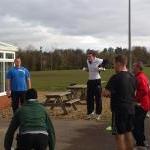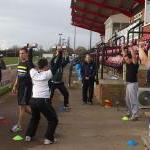6 ways to get better as a strength and conditioning coach.
 Reflections from tutoring an S&C coaching course
Reflections from tutoring an S&C coaching course
I am pleased to announce that on Saturday 6 people passed the level 1 Strength and Conditioning for Sport Course, and 2 passed the level 2.
There were some excellent examples of coaching practice on the day, using skills and knowledge gained from the previous workshops, their studies and their own experiences.
I always learn something from these days, especially on how the candidates approach the task. Most seem quite concerned about exercise choice, rather than how they deliver and stick to the plan.
 I was especially pleased that 1 candidate who made a complete hash of his first assessment, managed to turn it around on being given a 2nd chance later in the day and showed that he is actually quite a good coach.
I was especially pleased that 1 candidate who made a complete hash of his first assessment, managed to turn it around on being given a 2nd chance later in the day and showed that he is actually quite a good coach.
Reflections on the course.
One of the aspects of this course that has changed is that the final task is now a look at Reflective Practice and how this can help with Continuing Professional Development. This is sometimes a tricky period as people may have failed on the day, but it is an essential part of Coaching that is often overlooked. I don’t count the “score on 1-5” aspect of feedback, it is more random number gathering that doesn’t help.
Some points came up from this group:
- Read the online resources (I add research articles or practical drills every month to the resources section of Excelsior for every candidate to access).
- Use reflective practice: Whether this is daily, weekly or half termly (teachers especially struggle with anything more than firefighting in term time). We talked about using tools like Dictaphones (Evernote is my preferred option at present) or notepad and paper to help.
- Do something different. It is very easy to get institutionalised and work with the same group of people in the same environment and not be challenged. That leads to staleness and not enough critical analysis. Working with other coaches in the same environment, or change sports, or get out of sport all together will help. One of the coaches mentioned using Twitter as an opportunity to learn from others, people outside of your usual contacts and see what they say. Seth Godin, Vern Gambetta, Mike Boyle all add value. “Twitter is coffee break learning.” It is a “stream of consciousness and knowledge, that you can dip your toe into at any time.”
- Courses. Further down the list than you may think. Going on a course may seem like the easy answer, but you have to question how that course will help you. If it requires you to learn by rote some specific text in order to get an “accreditation” , then how is that helping? Of course, some stuff like First Aid is mandatory. Learning is changing, and the current group of A level students will soon realise that there is more to education than “teaching to the test”. If you have to spend £30,000 on 90 weeks where you have 6 hours of contact with a faculty member in a class of 100 people, is that good value? How else could you invest £30,000 and that amount of time? (PLEASE SUGGEST IN COMMENTS).
- Books. Again, everyone mentioned time. Those of us who work for a living, find the time to read a book cover to cover almost impossible. I suggested a couple that are easy to read and in digestible chunks. There is something to be said for learning from a sequence of thoughts and experiences in a well structured book, compared to random journal articles.
- Do it yourself. It has to be said that there seems to be a fear of “having a go”. No it may not be perfect, but all the coaches I saw at the weekend can help their athletes get better. Interacting with athletes, making mistakes, learning and improving is far better than just theorising or paying money out to go on courses. It does take guts and a bit of a thick skin to put yourself out there, but “If not you, then who?”
The Future of Learning
Everyone then wrote down 3 things they were going to achieve in the next 2 months. I emphasised the need for communities of practice, and not to get isolated. Hopefully I will see some of them in the future.
If you are interested in developing your skills, and improving your craft, then why not host one of our cpd coaching courses?

Not having a direct background in the topic, i found the subject challenging. The background reading, tutor led and peer conversations definitely added value to my experience and will definitely allow to me to continue to change and adapt my coaching. Thank you for the course.
Great course, no schowing chickens (static hamstring move), and have kept it simple with my clients and we get on with the session more. Great tips through out the weekend, didn’t see myself training young athlete’s and now have an opportunity to do so. Will be getting your book on training young athletes.
Stuart Aimer
As the person who made a hash of his lifting session, I appreciated having a second chance. Failure is part of training it is how you respond and the support you receive that are the keys to success.
This was my email to James which I am happy to share with you all.
For me a course is of value when it is both informative and challenging. If the purpose of attending is to validate what you already know there is little reason to attend.
It can be tempting to stay in your own bubble, but progress and development is not made in the comfort zone. A well designed programme is one that makes demands on you, this leads to change.
James Marshall’s approach is to challenge and asks questions on the, what, why and how you coach. I have had to go away and address areas, to make me a better coach, the feedback I received, was clear, honest and direct. As with the athlete’s he trains he wants you to get better and gives you the support and opportunity to improve areas of weakness.
I have certainly benefited from his coaching and the course structure to be a better coach, to the athletes I am privileged to work with.’
My take-away from Saturday is how do I get more bang for my bucks in the programmes I deliver, I believe that there needs to be a continual review of the what,why and how we do things. That is where is where the CPD’s come in and why those strategies are important. After all the new certificate on the wall is not going to train your athlete.
Mark Sheppard
I like the comments!!
I was really impressed with the quality of coaching on Saturday and congratulations to you all for passing.
I have come away with a few new CPD aims also It was great to meet you all and it is definatley all about mixing up the formal and informal learning!!
Thanks
Fran
First and foremost thank you for your time and efforts James. The course was both very informative and extremely interesting. In a stream of extremely fast flowing water, James has a very good way of showing you where all the juicy Salmon are but leaves you to figure out how to catch them.
I would recommend this course to anyone but fundamentally I would recommend meeting James. James is; Inspirational, Intense, Knowledgeable, Inspiring, Human, Passionate, committed to excellence, confident, enthusiastic and above all else he is all about the ATHLETE, not targets and figures. It is far too easy to slip into that mind-set, become institutionalised and assume everyone else is driven by the same values. Thank you Coach Excelsior you have shown me the light..in the world of twitter, #Refreshing!
Great, thought provoking post as always James.
For me, a £30,000 investment would be better spent undertaking internship programmes with the best coaches around the world that I could find.
Not only would you learn the theory behind the practice, but you would also (and much more importantly) learn how to effectively apply that knowledge on a day-to-day basis.
Brian Ellicott.
Thanks for all the comments and inputs everyone. It is nice to get such constructive feedback at the end of a course.
I think the £30,000 question is a good one. How best to spend that on development? Someone sent me a good video which I will integrate into a blog later this week, expanding on this further.
[…] Continuous improvement is everything – success is a moving target. […]